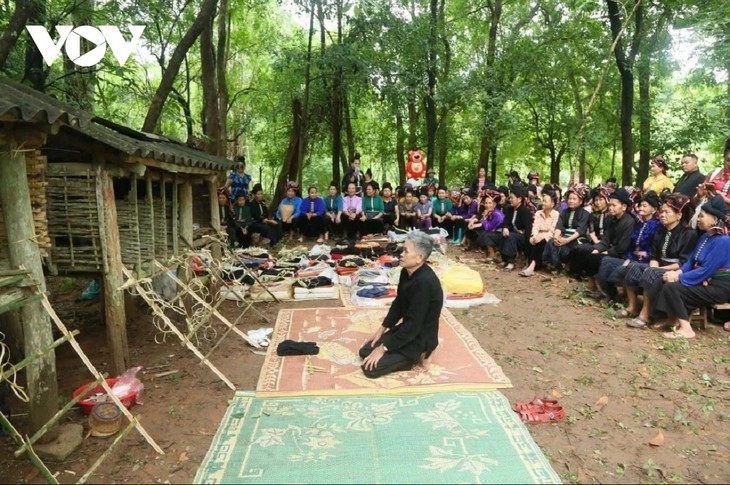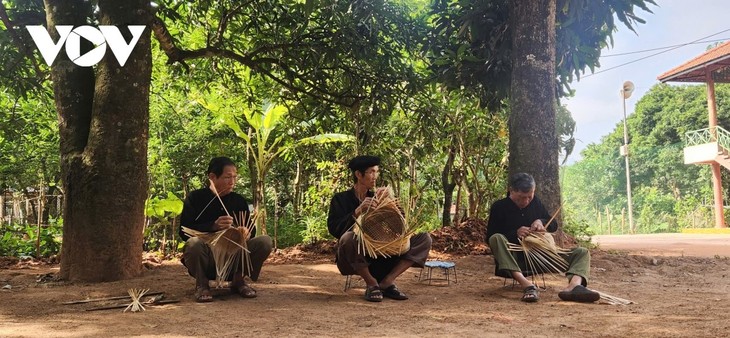(VOVWORLD) - Community-based tourism offers visitors a relaxing experience with the rich cultural heritage of the Thai people in Sơn La Province. With its stunning natural landscapes and a comfortable new rural setting, Kha Hamlet has emerged as a captivating destination for travelers exploring Sơn La and the Northwest region.
 Kha villagers celebrate Dong Edit ritual. (photo: Thu Thuy) Kha villagers celebrate Dong Edit ritual. (photo: Thu Thuy) |
Kha Hamlet is conveniently located along Highway 6, making it easily accessible for travelers. Home to around 90 Thai households, the hamlet offers visitors a chance to immerse themselves in the tranquil charm of an ancient Thai village under the shade of century-old mango and tamarind trees. The village is nestled beside the meandering Vat Stream, with lush rice fields stretching into the distance.
The locals continue to preserve and celebrate their rich cultural heritage. Visitors can stay in traditional Thai stilt houses, participate in indigenous festivals, enjoy folk singing and musical performances, and observe skilled artisans weaving brocade, embroidering scarves, and crafting bamboo household items like rice steamers, fish baskets, and traps.
Quang Van Phanh, a Kha villager, said: "On the 10th day of the first lunar month, we hold a grand ceremony to pray for the health and prosperity of the villagers, bountiful harvests, healthy livestock, and a life free from illness."
Endowed with natural advantages, Yen Chau district is piloting a rural tourism development project in Kha hamlet. The 5-year project with a total investment of about 1.7 million USD builds key infrastructure, including the welcome gate, reception area, parking lot, and electric shuttles to transport visitors. The village will also have souvenir stalls, interactive entertainment areas, and miniature landscapes.
 Kha villagers demonstrate weaving bamboo items for tourists. (photo: Thu Thuy) Kha villagers demonstrate weaving bamboo items for tourists. (photo: Thu Thuy) |
Lu Van Cuong, Chairman of the Yen Chau district People’s Committee, said that to transform Kha Hamlet into a model community-based tourism destination aligned with the rural development program, the authorities are developing cultural and environmental standards for the village. Additionally, training programs are being organized to raise people’s awareness about cultural preservation, promote proper etiquette in tourism services, and establish professional standards for tourism-related businesses.
Cuong said: “We have plans to organize study tours for the local people to other tourism sites with similar conditions. We send the villagers to training programs to learn about community-based tourism. We have received the green light from the provincial authorities to turn Kha hamlet into a model cultural tourism village, so it can access funding from the national target program and other legal financial sources for further development.”
As part of the rural tourism development project, Kha hamlet has selected five households to upgrade their homes into homestays, three families to open ethnic restaurants, and three others to demonstrate brocade weaving, embroidery, and bamboo handicrafts for tourists. The hamlet has formed two traditional folk-art troupes to regularly entertain tourists. All households have been trained on community-based tourism to enhance the visitor-experience.
Villager Vi Thi Thanh said: “My family has registered to offer homestays. We have bought new bedding items for tourists. We prepare Thai dishes for tourists, such as papaya soup, boiled young bamboo shoots, grilled chicken and fish.”
Quang Van Chien, Vice Chairman of Sap Vat communal People’s Committee, said: “We’re glad that the province supports us to develop community tourism. We have worked with the district and consultancy agency to survey and upgrade roads and establish a Tourism Cooperative to train people on working in the tourism industry.”
Kha villagers are leveraging their advantageous geographic location and natural conditions to develop sustainable community-based tourism, preserve their indigenous culture, and create additional income opportunities for local residents.